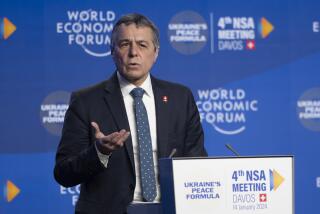Hopes Dim for Broad Accord at WTO Talks
- Share via
HONG KONG — Facing the possibility of mass protests, delegates from 149 countries at the World Trade Organization gathered here today to try to eke out some gains in negotiations despite a deep rift between rich and poor nations over farm policies.
There was little optimism among the 5,800 delegates on hand for the latest WTO meeting, which was originally supposed to generate a broad agreement on agricultural and industrial tariffs that would largely benefit developing nations.
But with little hope of that happening during the weeklong session, trade ministers and WTO officials now have much more modest goals, including an agreement to help boost exports by 32 of the world’s poorest countries.
By sharply lowering expectations, the Geneva-based group hopes to avert the kind of devastating collapse in talks that occurred at the last WTO ministerial meeting in Cancun in September 2003. That summit faltered largely over the same issues of wealthy nations’ farm subsidies for cotton and other crops.
The move also raises serious questions about the WTO’s ability to craft a new set of trade accords by the December 2006 deadline, five years after the latest round of talks was launched in Doha, Qatar’s capital.
With the proliferation of narrowly tailored bilateral trade pacts between nations, and as many residents in the U.S. and the European Union remain uneasy about globalization, some analysts say that making meaningful progress in Hong Kong is crucial to sustaining a multilateral trade system.
“A collapse here means the Doha round will be knocked off-rail for years to come,” said Keith Rockwell, a spokesman for the WTO. Indeed, some of the 2,167 representatives of nongovernmental organizations registered for the conference argue that an impasse would reflect on the WTO’s failure to deliver significant gains to both rich and poor countries. These groups, including those representing interests of states such as California, want to restrain the latest global trade negotiations and their sway over domestic policies.
Against this backdrop, many delegates here are expected to meet around the clock this week, cajoling and horse-trading on a wide range of issues that involve trade barriers on agricultural, services and industrial goods. The WTO’s hope is that delegates will make enough progress to justify another ministerial meeting in the next few months.
But farm policies of wealthy nations remain a key stumbling block.
The European Union has been criticized by many countries, including the U.S., for failing to offer deeper reforms in its protectionist farm subsidies and tariffs.
On Monday in Hong Kong, EU Trade Commissioner Peter Mandelson said he would not offer any new agricultural concessions during this week’s meeting, in part because other developing countries, he claimed, were not offering enough to further open their markets to goods and services from EU countries.
The U.S., in particular, has been criticized for not putting more on the bargaining table. Despite what U.S. officials consider a bold and aggressive package that would slash farm subsidies and eliminate them by 2010, African countries complain that more action needs to be taken to address $4 billion of U.S. support to cotton farmers that have depressed global prices.
U.S. trade officials, facing continued political pressure from the battered textile industry in the South, have also been criticized for not doing more to remove trade barriers that are restricting apparel from poor countries such as Bangladesh.
In a briefing Monday in Hong Kong, U.S. Trade Representative Rob Portman said the American market was the most open among developed countries. He and others in the 200-plus U.S. trade delegation didn’t discuss additional cotton proposals that loom as a flashpoint at the talks. The issue of cotton subsidies needs to be addressed in the context of broader agricultural market openings, Portman said.
He also called on China, which has been unusually silent leading up to the current WTO talks, to step up in the negotiations.
“They have a responsibility to do more to open up” their markets, Portman said, noting that China was the world’s biggest purchaser of cotton.
Celso Amorim, Brazil’s foreign minister and a key player in the negotiations along with India, said it would take a miracle for the Hong Kong talks to be a success.
The EU and the U.S. want developing countries such as Brazil and India to open up their markets to services such as telecommunications, banking and distribution. But India is looking at the WTO to establish a standard on the free movement across borders for engineers and others in the service sector.
But California legislators, particularly sensitive to the migration of Indian workers into the U.S. technology sector, have already warned U.S. officials about cutting any such deals.
“What we’re trying to show is what the U.S. is negotiating is not representative of the states,” said Laura N. Metune, a consultant to the California Senate Select Committee on International Trade Policy and State Legislation.
Such views reflect the many narrow interests that delegates face as they try to hammer out agreements on specific trade formulas. In the WTO, dissension from even one member nation can hold back agreements.
The meeting, which is scheduled to run through Sunday, is being held at Hong Kong’s convention center, which was heavily cordoned off. On Sunday, 3,000 to 4,000 demonstrators staged a peaceful rally in the streets that had a circus-like atmosphere.
As WTO officials were preparing for opening ceremonies today, protesters were mobilizing near the convention center. Closer to the meeting site, police were stationed on rooftops, barricades were everywhere and metal detectors were placed at hotels and throughout the convention facility.
Authorities are expecting large-scale protests today and near the end of the conference.
More to Read
Sign up for Essential California
The most important California stories and recommendations in your inbox every morning.
You may occasionally receive promotional content from the Los Angeles Times.











